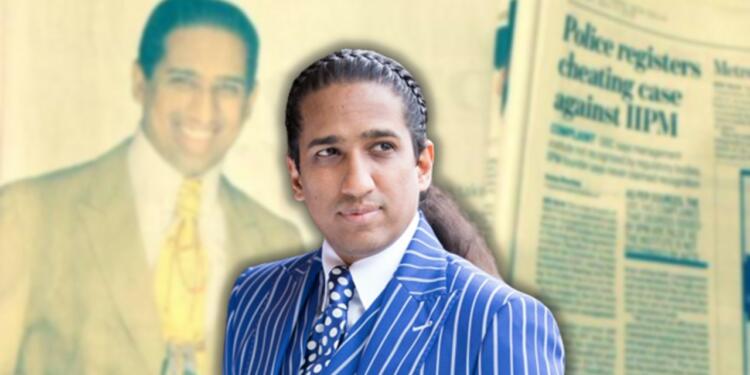“Dare to think beyond IIMs”!
Winner of 3 National Film Awards as a Producer!
Stars like Shahrukh Khan and Amitabh Bachchan ready to vouch for his brand!
Infinite advertisements on the front page of almost every known newspaper in India!
Scam 2015: Meet Arindam Chaudhuri, a name that once resonated throughout India’s entrepreneurial landscape. With such a vivid and impressive profile, you could almost think of this guy as the ‘next big thing in India’s entrepreneurial circle.’ He was the “maverick management guru,” a visionary, and an inspiration to many.
But, there’s always a ‘but.’ Yet, one thing, just one thing, made Arindam Chaudhuri transition from a “maverick management guru” to a disgraced fraud – his PRIDE.
Today, Arindam Chaudhari is another nobody, and his institute exists merely for formality. The media that once glorified him has turned its back, the government has distanced itself, and the narrative has shifted.
But how did a man, who once had the media, the government, as well as the narrative in his pocket, become a joke of a kind? Today, we shall delve into the rise and fall of Arindam Chaudhuri, exploring the lessons to be learned from his extraordinary journey and the titanic downfall.
When Malay Kishore Chaudhuri dreamt of IIPM
In 1973, a businessman named Malayendra Kishor Chaudhuri made a pivotal decision: he chose to venture into the realm of education. With a vision to offer an alternative to the renowned Indian Institutes of Management (IIMs), he laid the foundation for what would become the Indian Institute of Planning and Management (IIPM).
Founded in 1973 by Malayendra Kishore Chaudhuri, IIPM was conceived as a distinctive alternative to the prestigious IIMs. Yet, it was not until later that this family-driven educational enterprise took a significant turn. The reins of entrepreneurship transitioned from father to son, as Arindam Chaudhuri, a graduate of IIPM himself, assumed the helm. With zeal and ambition, he sought to propel his father’s legacy to new heights.
Also read: Karsanbhai Patel: The entrepreneur who cycled his way to the top with NIRMA!
By 2004, Arindam Chaudhuri’s influence extended beyond education. He was appointed as a member, focusing on the social and agricultural sector, for the Consultative Committee of the Planning Commission under the Government of India. Moreover, he founded Planman Consulting and the Great Indian Dream Foundation, a social sector organization. His entrepreneurial endeavors spanned diverse fields, including ownership of the Delhi franchise in the i1 Super Series motor sports league.
Amidst India’s emergence as a formidable economic powerhouse in the early 21st century, Arindam Chaudhuri seized every opportunity to promote his institution vigorously. He positioned IIPM as an audacious alternative to the esteemed IIMs and IITs. Its motto was nothing short of audacious: “Dare to think beyond IIT and IIM.”
IIPM expanded rapidly, boasting affiliations with the International Management Institute of Belgium and branches in 18 cities across the nation, including New Delhi, Noida, Mumbai, Gurugram, and more.
Notably, Arindam Chaudhuri’s business ventures extended beyond education, encompassing management, consulting, human resources, and media. Each of these domains was managed through separate companies, collectively amassing substantial revenues, with a reported figure of Rs 533 crore in 2010-11, definitely not a small amount by any means.
How Arindam Chaudhuri became the top ‘salesman of education’
I’m not an ardent follower of Tamil cinema, but a particular dialogue from a movie named Vaathi caught my attention. Dhanush, in a moment of on-screen brilliance, declared, “Education is like the prasad in a temple, it should be given to everyone. It shouldn’t be sold as a dish in a five-star hotel.” A powerful message indeed, but one that seemed diametrically opposed to the actions of a certain individual – Arindam Chaudhuri.
Chaudhuri, a name synonymous with controversy and deceit, had a starkly different approach. He marketed education as an exclusive product, reserving it for a privileged few. Even for those who gained access to his offerings, the promise of a brighter future remained elusive.
To compound matters, Chaudhuri possessed a penchant for legal warfare. If you dared to challenge him or his institution, you’d soon find yourself embroiled in defamation suits. In his own words, “Please go to the Internet and fill it up. If you say Arindam Chaudhuri is ugly and has a bad sense of dressing, I will not say anything. But if you say anything to harm my business, then I will sue you,” he proclaimed on a CNN-IBN show, vehemently defending his litigious actions against critics and publications.
The question that lingers is: How did IIPM manage to deceive and entrap so many unsuspecting students? Maheshwar Peri, the former heavyweight at Outlook magazine and the founder of Careers360, may hold the answer. In an interview with Scroll, Peri shed light on the manipulative tactics employed by IIPM. He revealed, “While every regulatory body called it illegal, IIPM managed to entrap some 30,000 students. Since our first expose in 2009, at least 15,000 students were further misled into signing up for IIPM’s courses. Many such students are entangled in various consumer courts, attempting to navigate a system that, despite a high court order, continues to frustrate them. Injunctions, cases, and trials drag on endlessly.”
Maheshwar Peri: The man, who refused to give up!
But one individual refused to capitulate in the face of this educational charade. Maheshwar Peri, a resolute figure, declared, “Typically, to avoid court appearances and legal costs, respondents tend to try to settle once a case is filed against them. But this was different as we decided to pursue the cases instead of agreeing to a compromise or letting the cases lie in cold storage. We decided to turn their cases on their head, and make a court confirm our charges against IIPM.”
In essence, Maheshwar embarked on a relentless battle against Arindam Chaudhuri, determined to halt the further exploitation of young students through the commercialization of education.
Also read: The Billion-Dollar Fragrance: India’s robust dhoop and agarbatti market
Peri revealed another layer of the sinister plot, stating, “It wasn’t just the IIPM that sued – in some cases, the cases were filed by its group companies, employees, and even an agent. All this because IIPM by itself could not file more than one case. IIPM was into ‘forum shopping.’ IIPM and we were based in Delhi, but the employees of IIPM filed the cases in Kamrup and managed an injunction gagging us from telling the truth.”
What’s more, before it became a trend amongst left liberals, Arindam Chaudhuri utilized paid editors to manipulate content in his favor. The IIPM allegedly employed paid editors to tamper with its articles and those of its critics on the English Wikipedia, all in the name of self-promotion. A Wikipedia user, known by the username Wifione, played a prominent role in these activities, systematically erasing any content critical of the institute.
As time passed, Wifione’s influence grew, leading to an appointment as an administrator, a position from which the manipulation continued. Shockingly, it was revealed that Wifione had operated at least 60 “sockpuppet” accounts on the website to skew discussions in favor of IIPM’s interests.
In the end, justice had its day. In September 2014, the Delhi High Court delivered a significant blow to IIPM. The court ruled that approval from the All India Council for Technical Education (AICTE) was mandatory for conducting management courses, which IIPM lacked. The court criticized IIPM for misleading students and prohibited it from using terms like MBA, BBA, management course, and b-school to describe its programs.
Justice also caught up with Arindam Chaudhuri personally, as he faced arrest in 2020 for tax evasion. While he managed to secure his release, it was a taste of humility in a long-overdue reckoning for the man behind the IIPM saga. In the grim chronicles of Arindam Chaudhuri’s reign, the vision of quality education remained an elusive mirage for many, even as his empire thrived on deceitful assurances and legal acrobatics. This stark contrast between his actions and the sermons he espoused serves as a harsh reminder of the dangers of turning education into a commodity, exploiting the aspirations of impressionable young minds for personal gain.
Support TFI:
Support us to strengthen the ‘Right’ ideology of cultural nationalism by purchasing the best quality garments from TFI-STORE.COM




























